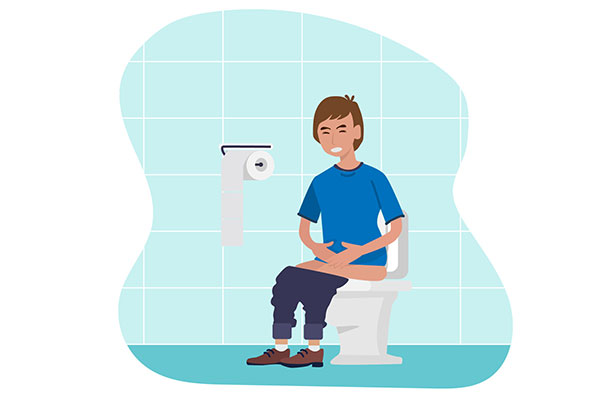
There is a lot of misinformation out there about CBD oil and its potential to cause constipation.
Some people say that CBD oil causes constipation, while others claim that it cures it. So what’s the truth?
In this blog post, we will explore the relationship between CBD oil and constipation and determine whether CBD oil can help cure constipation or not.
What causes constipation?
A variety of things can cause constipation, including diet, medications, and medical conditions. Excessive consumption of fatty foods, dehydration, and lifestyle elements such as inactivity and lack of water can all contribute to constipation.
Constipation can be caused by several factors, including:
- a diet low in fiber, which makes the stool harder to pass.
- Dehydration can make it hard for your body to break down food waste.
- Lack of exercise or activity that slows movement through your digestive tract (for example, sitting for long periods) and makes it harder to pass stools from the rectum
- There are medications such as painkillers, iron supplements, and antacids that can slow down the digestive process.
- medical conditions like irritable bowel syndrome (IBS), pelvic floor dysfunction, and thyroid problems.
CBD oil for constipation?

There is some evidence that CBD oil may help relieve constipation. A small study published in the journal Cannabis and Cannabinoid Research in 2016 found that people who took CBD oil for two weeks reported less severe symptoms of constipation than those who didn’t take CBD oil.
The authors of the study say that CBD oil works by interacting with receptors in the gut, which may reduce inflammation and help improve digestive function. In addition, CBD oil is great for pain relief.
However, more research is needed to know whether CBD oil is an effective treatment for constipation.
If you are experiencing constipation, talk to your doctor about the best way to treat it.
Over-the-counter supplements to relieve constipation

There are a variety of OTC(over-the-counter) supplements that can help relieve constipation. These include fiber supplements, laxatives, and stool softeners.
It’s critical to get the appropriate supplement for you and to follow the directions precisely. Some supplements can be taken daily while others should only be used as needed.
- Fiber supplements contain psyllium husk powder or wheat dextrin. Both of these types of fiber increase the number of soft stools in your gut and promote bowel movements.
- Wheat dextrin is a type of soluble fiber that absorbs water in your gut and increases stool bulk, making it easier to pass with CBD oil for constipation.
- Stool softeners, which include docusate sodium or calcium docusate, make it easier for you to pass stool by lubricating it. These types of supplements should be taken with CBD oil for constipation.
- Laxatives cause the muscles in your intestines to contract and push feces out. There are several OTC (over-the-counter) and prescription laxatives on the market. Laxatives should be taken with CBD oil for constipation only if other measures haven’t worked.
It’s important to talk with a CBD oil for constipation doctor before taking any of these supplements.
If CBD oil is making you constipated, there are a few things you can do about it if this is the case. You could eat more fiber and drink water or take over-the-counter fiber supplements such as bran muffins or bananas with CBD oil for constipation.
The link between the endocannabinoid system and the digestive system
The endocannabinoid system is a biochemical communication network that exists in all mammals. The sympathetic and parasympathetic nervous systems interact to regulate a variety of physiological operations, such as hunger, metabolism, pain sensation, and motor communication.
It also aids in the maintenance of body equilibrium, particularly in the digestive system.
The two main receptors in this system are as follows:
- CB12
- CB11
These receptors are located throughout the body, including the digestive tract. When these receptors bind to endogenous cannabinoids from cannabis plants or synthetic versions of those compounds, they can help regulate various functions related to digestion such as appetite and metabolism.
CBD oil for constipation may be beneficial because it can help reduce inflammation in the GI tract and improve gut motility. This means that cb12 receptors are located on cells lining your intestines, which are responsible for regulating digestion. cb11 receptors are located on the nerve cells that control gut motility.
CBD oil is helpful for a variety of digestive conditions, including constipation, IBS, and Crohn’s disease. It can help to reduce gastritis, improve gut motility and decrease inflammation in the gastrointestinal tract.CBD oil may be beneficial for people with constipation.
It’s critical to conduct extensive research before using CBD oil for constipation. There are many different brands of CBD oil on the market, and they all vary in quality. Make sure you choose a high-quality product that has been tested by an independent lab.
Can CBD oil cause constipation?

There is no definitive answer to this question as the effects of CBD oil on constipation will vary from person to person. Some people may find that CBD oil helps relieve their constipation, while others may experience the opposite effect.
One possible reason for this discrepancy is that CBD oil can have different effects depending on the dosage. A higher dosage of CBD oil may be more likely to cause constipation, while a lower dosage may be more effective in relieving constipation.
It is also important to note that CBD oil can have different effects depending on the type of cannabis strain used. Some strains of cannabis(CBD) are known for their laxative effects, while others are not. Therefore, it would make sense that CBD oil derived from the latter type of cannabis strain could be more likely to cause constipation than CBD oil derived from the former.
Of course, CBD oil itself is not a laxative and therefore cannot directly cause constipation. However, owing to CBD’s anti-inflammatory properties, it may have an indirect influence on your digestive system and induce constipation.
For example, CBD oil may slow down your digestion, which could lead to constipation.
Overall, the jury is still out on whether or not CBD oil can cause constipation. More research is needed to determine if there is a link between CBD oil and this digestive condition. However, it is important to be aware of the potential side effects and to consult your doctor if you start experiencing any unusual symptoms after taking CBD oil.
How to improve constipation
You may be able to avoid constipation. The following are some of the methods you can use to help prevent constipation:
- Eating a high-fiber diet, including whole grains, fruits, and vegetables,
- Drink plenty of fluids, especially water.
- Exercising regularly
- When you have to go to the bathroom, it is important to use it.
If these lifestyle changes don’t help, your doctor may prescribe a laxative or stool softener.
Conclusion: CBD Oil and Constipation
There is not much CBD-specific research on constipation, although there is plenty of research regarding its efficacy.
Additionally, CBD oil has been shown to aid with other gastrointestinal concerns such as irritable bowel syndrome (IBS) and Crohn’s disease. It also aids in the reduction of inflammation, which is the cause of many diseases. For individuals who are having difficulties with constipation, CBD oil may be an excellent choice.
Before you buy CBD oil, do your homework and ensure that you get a high-quality product.
Remember that CBD oil can have different effects depending on the cannabis strain used, so make sure to choose one that is known for its laxative effects. If you experience any odd symptoms after taking CBD oil, speak with your doctor.
